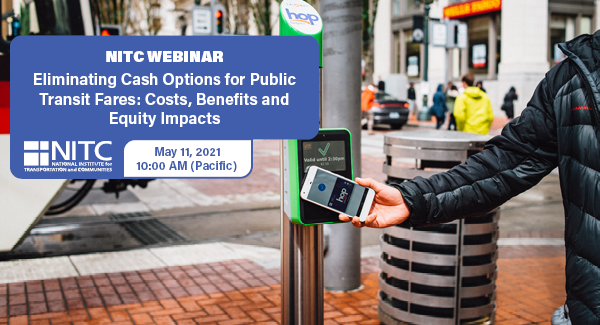
PRESENTATION ARCHIVE
OVERVIEW
Many transit agencies plan to automate their fare collection and limit the use of cash, with the goals of improving boarding and data collection while lowering operating costs. Yet about 10% of adults in the United States lack a bank account or credit card, and many either rely on restrictive cell-phone data plans or don’t have access to internet or a smartphone.
This webinar will present part of a larger research project exploring these issues in the cities of Denver, Colorado, and Eugene and Portland–Gresham, Oregon. In this part, we explore the tradeoffs between reducing cash acceptance, ridership and the costs of fare collection systems. How much does it save to reduce cash acceptance, verses ridership and equity impacts?
We will also present a cost-effectiveness framework that combines a qualitative and quantitative analysis and use this model to explore case scenarios in our three cities. The model shows that adding a retail network to facilitate fare payment as well as preserving cash acceptance on board buses through the farebox are highly effective solutions. The model is customizable for any agency and similar analyses can be run for different configurations of fare collection systems.
KEY LEARNING OUTCOMES
- The extent and dimensions of digital and banking divide in the US and among transit riders;
- How emerging cash-less fare payment will exclude certain transit riders;
- Equity mitigations available to include transit riders challenged by cash elimination;
- The costs and benefits of such equity mitigations
THE RESEARCH
This webinar is based on a study supported by a pooled-fund grant through the National Institute for Transportation and Communities (NITC) and conducted at three universities: Portland State University, the University of Oregon, and the University of Tennessee, Knoxville. In addition to NITC, the funding partners were City of Eugene, OR, City of Gresham, OR, Lane Transit District, Clevor Consulting Group, and RTD Denver. Read more about the research: An Equity Lens on Automated Fare Payments.
SPEAKER
Dr. Golub is an associate professor and director of the Toulan School of Urban Studies and Planning at Portland State University. His work focuses on the social equity impacts of current transportation planning practices – how people participate in planning, and who wins and loses from transportation plans and investments. Dr. Golub teaches courses on urban transportation policy, planning research methods, transportation finance and public transportation.
PROFESSIONAL DEVELOPMENT
This 60-minute webinar is eligible for 1 hour of professional development credit for AICP (see our provider summary). We provide an electronic attendance certificate for other types of certification maintenance.
LEARN MORE
Sign up for our newsletter to get updates on our events.
Photo courtesy of TriMet
This webinar is hosted by the Transportation Research and Education Center (TREC) at Portland State University. The research was funded by the Summit Foundation and the National Institute for Transportation and Communities (NITC), a program of TREC and one of five U.S. Department of Transportation national university transportation centers. The NITC program is a Portland State-led partnership with the University of Oregon, Oregon Institute of Technology, University of Utah and new partners University of Arizona and University of Texas at Arlington. We pursue our theme — improving mobility of people and goods to build strong communities — through research, education and technology transfer.

